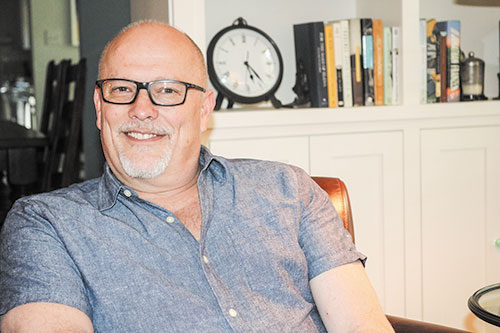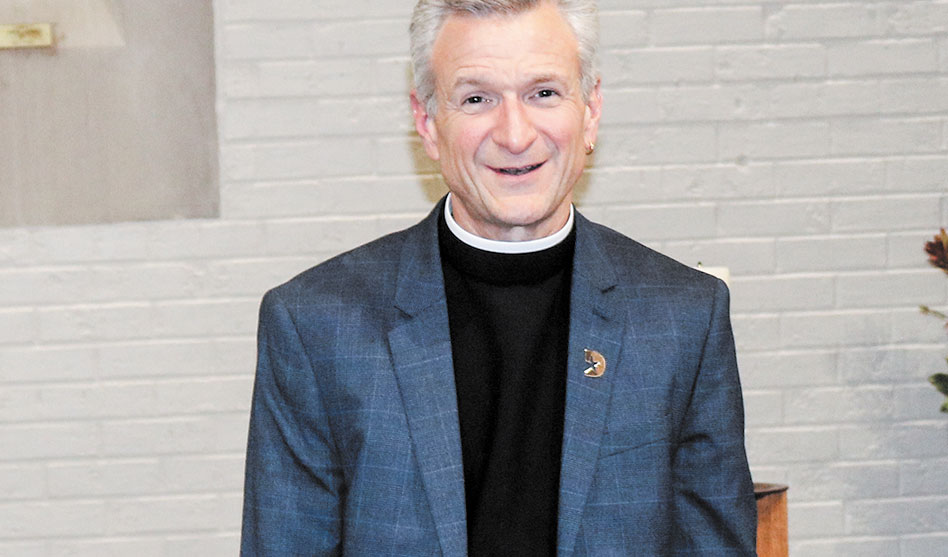The Rev. Christopher Thomas
Protests around the country question the legality as well as morality of shelter-in-place
DAVID TAFFET | Senior Staff Writer
taffet@dallasvoice.com
Over the last couple of weeks, a variety of groups have staged protests around the country, calling on elected officials to end the COVID-19 lockdown, questioning both the legality and the morality of the numerous disaster declarations.
In Austin, Infowars podcast host Alex Jones organized a demonstration outside the Texas Capitol on Saturday, April 18. The “You Can’t Close America” protest included anti-vaccine advocates, with protesters holding signs supportive of President Trump and denouncing the country’s foremost epidemiologist, Dr. Anthony Fauci.
Signs read, “We are not prisoners,” and “My body my choice” with a face mask crossed out, to stress they were protesting COVID-10 quarantines, not anti-choice abortion laws.
On Tuesday, April 21, a group of folks under the banner of Park Cities Republican Women protested in Dealey Plaza, saying they had the right to decide for themselves when to go out and where to shop.
On social media, a number of people, including some in the LGBT community, have posted videos and pictures of themselves partying in groups, ignoring social distancing and flaunting the stay at home orders in place in both the city of Dallas and Dallas County.
On the other hand, Texas Gov. Greg Abbott on March 29 signed one of the strictest quarantines in the country that applies to people traveling into Texas from Louisiana, enforcing it with troopers at all major state highway crossings from Louisiana.

Jimmy Owen
Louisiana has had three times the number of deaths as Texas with one-sixth the population.
“A covered person [someone traveling to Texas from Louisiana] shall remain in the designated quarantine location for a period of 14 days or the duration of the person’s presence in Texas, whichever is shorter, leaving only to seek medical care or to depart from Texas,” the order reads.
The order says Department of Public Safety special agents will visit the place of quarantine unannounced to confirm covered persons are complying. Failure to comply could result in fines up to $1,000 and up to 180 days in jail.
But are quarantines and stay at home orders legal?
Chapter 418 of the Texas Government Code refers to emergency management powers of the governor regarding law enforcement and public protection. The section is referred to as the Texas Disaster Act of 1975.
The law makes the governor responsible for protecting people from dangers “presented by disasters” by giving him “broad authority to fulfill that responsibility.” The section gives the governor the power to issue executive order that have “the force and effect of law.”
The governor “may use all available resources necessary to cope with disaster” and “may control ingress and egress to and from a disaster area and the movement of persons and the occupancy of premises in the area.”
In this case, the entire state has, in effect, been declared a disaster area.
The fine and jail term are also prescribed by Section 418 of the code. That’s why Abbott imposed a $1,000 fine and up to 180 days in jail for anyone coming from Louisiana breaking quarantine.
There are limitations to the governor’s powers under this section of the law. He may not interfere with the dissemination of news but may require TV, radio and newspapers to issue public service messages.
The governor also may not interfere with the work of police or firefighters, and he cannot order the confiscation of firearms or ammunition from a person who is legally possessing those weapons.
But while powers given to elected officials under Texas law are clear, the constitutionality of the current law hasn’t been tested in court. Still shelter-in-place and even stricter quarantines appear to be legal under Texas law.
Regardless of the legality of the orders, the question remains: Why would people be protesting stay at home orders that are designed to prevent the spread of an illness that has already killed more than 48,000 people in the U.S. in the last month?
Counselor Jimmy Owen said the insistence on protesting and breaking quarantine reflects where some people are developmentally.
“They’re not looking at the long term,” he said, “not thinking of the concept of mortality.”
People begin to understand their mortality “as they grow into their adulthood,” he explained, adding,
“Ultimately, it comes from a place of ‘I need to live my life to the fullest.”
But he said from what he’s seen, most people in Dallas are following the rules and taking things thoughtfully.
And he thinks the LGBT community, especially those who lived through the AIDS crisis, are taking things very seriously.
“We’ve seen what happens when you don’t follow rules in ways other communities have not,” Owen said, referring to using safer sex and educating others as the LGBT community did during the AIDS crisis.
Some are using religious freedom as their justification to break the rules and demanding churches be exempt from social distancing. The Rev. Christopher Thomas, rector of St. Thomas the Apostle Episcopal Church, called those protesters selfish, although he said he understands people who want to get back to work because they have to feed their families.
But that’s not who he’s seeing protesting stay-at-home orders. He said the overarching religious principle is “What is the greater good?”
“Where are we meeting the risen Christ?” he asked. Of people he has seen in supermarkets this week without face masks, he said, “That’s selfish. You’re hurting other people.”
Thomas called demonstrators who are not worried about the health of other people un-Christian. “When materialistic needs cloud your vision,” he said, that’s not Christian. And, he said, the demonstrators who probably call themselves pro-life, don’t seem to actually value life based on their behavior.
But Lt. Gov. Dan Patrick’s latest statement on ending the quarantines — “There are more important things than living” — left Thomas speechless. “That does take my breath away,” he said. “That’s not the Christ I know.”
……………………
COVID-19 FACTS
How does the virus spread? The virus that causes COVID-19 is thought to spread primarily from person to person, mainly through respiratory droplets produced when an infected person coughs or sneezes.
Does the virus live in water? Coronavirus hasn’t been found in drinking water.
How long does the virus live in the air? Up to 3 hours.
Can the virus be transmitted through food? Coronavirus doesn’t seem to spread through food. Still, wash fruits and vegetables under running water before eating them.
How long does the virus live on other surfaces?
Aluminum: 2-8 hours
Ceramics: 5 days
Copper: Up to 4 hours
Cardboard: Up to 24 hours
Glass: Up to 5 days
Paper: A few minutes to 5 days
Plastic: 2-3 days
Stainless steel: 2-3 days
Wood: 4 days














Thank you for this.
Let’s put things into perspective, since you seem to be somewhat out of touch. DR. FAUCI CONVINCED THE OBAMA ADMINISTRATION TO GIVE WUHAN LAB $3.7 MILLION DOLLAR GRANT TO STUDY VIRUS. President Donald Trump said last Friday he will end federal funding for the Wuhan Institute of Virology that some are claiming spawned the coronavirus. At the daily coronavirus task force news conference, the president was asked why the National Institutes of Health would include the Chinese laboratory in a $3.7 million dollar stipend to conduct research. The reporter asked:
“The Obama administration gave them (Wuhan Lab) a grant of $3.7 million. Trump responded: “I’ve been hearing about that. We’ve instructed that if any grants are going to that area, we are looking at it literally about an hour ago and also early in the morning,. And then there is this: Dr. Fauci predicted in 2017, that the incoming Administration (Trump Administration) would see a pandemic like none before it.
Let’s remember this: In 2014, President Obama Provided an Update on the U.S.-Led Response to Ebola in which Obama said this: “Here’s the bottom line he said, “Patients can beat this disease. And we can beat this disease. But we have to stay vigilant. We have to work together at every level — federal, state and local. And we have to keep leading the global response, because the best way to stop this disease, the best way to keep Americans safe, is to stop it at its source — in West Africa.” This wasn’t even a pandemic, yet he said the near exact same thing as President Trump.
Let’s not forget something: The WHO (who has been bought and paid for by the Communist Chinese Gov’t) took in MILLIONS of American dollars and yet you fail to point to the $$$ that the WHO is making on this pandemic. They kept this information from the rest of the world for quite some time.
Dr. Tredo of the WHO isn’t even a doctor, but was placed into the WHO by said Communist Chinese Govt.
To put any blame or point fingers to how this administration is handling things is pure nonsense. I would urge you and your readers to look at the Chinese government for lying about this pandemic from the beginning. Also, what happened to all those doctors who told of this pandemic, and now are ‘missing.’
You’re right…this is about money. It’s about how much money the president has paid to help American citizens during this pandemic. It’s about money that was paid to help NYC, CA and other states inflicted by the COVID-19.
To suggest that it’s okay to keep people inside and in quarantine until mid summer, as is being suggested by the governor of Michigan.
Most democrat governors and mayors realize they will not see a democrat president in 2020, so this is the only way for them to rule by their ‘dictatorship’ style authority. Also, the mayor of L.A., who suggested that ‘snitches’ be paid to report those violating a quarantine is exactly something Hitler’s youth did. Best you fight for your freedoms (I will) to keep America free, or you’ll end up in the slavery of government.